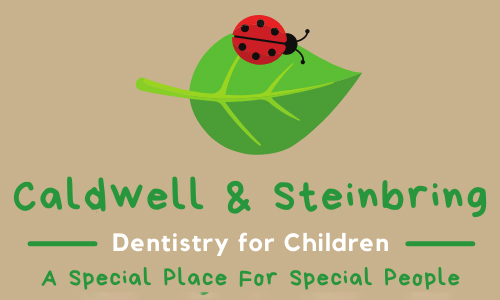Pediatric Dentistry
Although your child will lose his or her first set of teeth, those small pearly whites still require conscientious care. That is why it is important from an early age to begin visiting a pediatric dentist. Baby teeth (or primary teeth) may not last forever, but they serve some extremely important functions. And taking care of your child's oral and dental health now will ensure a future of happy and healthy smiles.
Important Functions of Baby Teeth
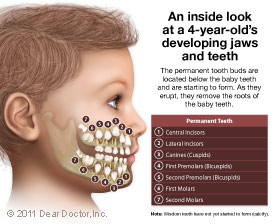 Baby teeth act as guides for the eruption of permanent (adult) teeth, holding the space for them. When permanent teeth are ready to come out, the crowns (tops) of the teeth push against the roots of the baby teeth, causing them to resorb, or melt away so the adult teeth can take their proper place.
Baby teeth act as guides for the eruption of permanent (adult) teeth, holding the space for them. When permanent teeth are ready to come out, the crowns (tops) of the teeth push against the roots of the baby teeth, causing them to resorb, or melt away so the adult teeth can take their proper place.
Additionally, primary teeth are solely responsible for a child's ability to chew, bite, and speak for about the first six years of his or her life. And as adult teeth grow in, the remaining primary teeth will continue to aid your child with these important functions. As such, you'll want to make sure those baby teeth stay healthy and are lost naturally—when it's time.
Your Child's First Teeth
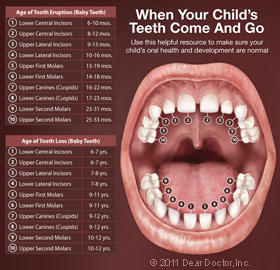 Your child will develop 20 baby teeth. These teeth start to appear usually when your child is between six and nine months of age, though in some cases development may start as early as three months or as late as twelve months. The two lower front teeth tend to erupt first, followed by the two upper ones. The first molars come in next, followed by the canines (eyeteeth). Sometimes your baby can experience teething discomfort during this time. If your baby experiences discomfort, please let your pediatric dentist know and we will advise you as to the best course of action.
Your child will develop 20 baby teeth. These teeth start to appear usually when your child is between six and nine months of age, though in some cases development may start as early as three months or as late as twelve months. The two lower front teeth tend to erupt first, followed by the two upper ones. The first molars come in next, followed by the canines (eyeteeth). Sometimes your baby can experience teething discomfort during this time. If your baby experiences discomfort, please let your pediatric dentist know and we will advise you as to the best course of action.
Your infant's gums and newly erupted teeth should be gently wiped after each feeding with a water-soaked gauze pad or a damp washcloth. Starting at age two (when there are significantly more teeth in the mouth) it is important for you to establish a daily brushing routine with your child. Utilize a small, soft-bristled toothbrush and no more than a thin smear of fluoridated toothpaste for brushing. Your child may need your help with this important task until he or she is about six years old.
Your Child's First Dental Appointment
The American Academy of Pediatric Dentistry recommends that you bring your child in for his or her first visit to a pediatric dentist or special needs pediatric dentist by age one. This may sound early, but it is very important that we begin instilling proper pediatric oral hygiene techniques, checking for cavities, and watching for developmental problems from an early age.
We want to make sure your child has a positive experience at our Sugar land, TX office from the start, and will become a regular visitor for years to come as a result. Moreover, we want to keep your child's smile healthy and bright. There are a number a number of forms of tooth decay that can affect babies and small children. Early Childhood Caries tooth decay, for example, can develop rapidly, progressing from the hard, outer enamel layer of a tooth into the softer, inner dentin in six months or less.
Pediatric Dental Treatments
There are a variety of dental treatments we provide at our Sugar Land, TX offices to prevent tooth decay in children and save or repair teeth when necessary. They include:
Topical Fluoride — Fluoride incorporates into the enamel of teeth, making the enamel harder and more resistant to decay. Although there is a small amount of fluoride in toothpastes and in some drinking water supplies, our pediatric dentist can apply a higher concentration onto your child's teeth for maximum protection.
Dental Sealants — Our dentist can apply a plastic coating that prevents cavities by sealing the little grooves on the chewing surfaces of back teeth known as "pits and fissures." These little crevices are the perfect environments for decay-causing bacteria to hide. Immature tooth enamel is more permeable and therefore less resistant to tooth decay. Dental sealants are an easy-to-apply form of protection that can safeguard your child's teeth for years.
Root Canal Treatment — Root canals save injured or severely decayed teeth. Most people think of this as an adult treatment, but sometimes children need root canals, too. As mentioned, baby teeth are important guides to the permanent teeth that are already forming beneath the gums. Accordingly, saving baby teeth from being prematurely lost can help prevent malocclusions ("mal" - bad; "occlusion" - bite), which require orthodontic treatment to fix.
Bonding — Chips and minor fractures to front teeth (common childhood occurrences) can be repaired with tooth-colored bonding materials. These lifelike bonding resins are made of plastic and glass. They can be used on baby teeth as well as permanent teeth, and they last until your child has completed his or her facial growth.
Orthodontic Concerns
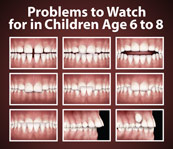 By age seven, most malocclusions have become evident. Interceptive orthodontic treatment around this time can help direct proper tooth positioning and/or jaw growth, eliminating or simplifying the need for more extensive orthodontic treatment later on. There are many orthodontic problems that can be detected early, so it is important that a trained professional should evaluate your child during his/her growth and development.
By age seven, most malocclusions have become evident. Interceptive orthodontic treatment around this time can help direct proper tooth positioning and/or jaw growth, eliminating or simplifying the need for more extensive orthodontic treatment later on. There are many orthodontic problems that can be detected early, so it is important that a trained professional should evaluate your child during his/her growth and development.
Sports & Your Child's Teeth
If your child is active in sports, our pediatric dentist highly recommends a custom-made mouthguard. According to the American Dental Association, an athlete is 60 times more likely to suffer dental harm when not wearing one of these protective devices. We can have a mouthguard custom-made specifically for your child using a model of his or her teeth that will offer greater protection than an off-the-shelf model. It's an investment that can save you pain, suffering, and dental expenses down the road! Please ask us about mouthguards at your child's next appointment in our Sugar Land, TX office.
Beginning the Journey
Set you child on the road to a lifetime of healthy, beautiful smiles. Contact Drs. Caldwell and Steinbring today and begin your child's pediatric dentistry journey.
Related Articles

Dentistry and Oral Health for Children Dear Doctor magazine brings you this wide-ranging overview of milestones and transitions in your child's dental development. Learn how to protect your children from tooth decay, dental injuries, and unhealthy habits while getting them started on the road to a lifetime of oral health and general well-being... Read Article

Pregnancy & Oral Health Pregnancy is generally thought of as the time when a woman strives to be particularly aware of the need for better health. Many women, though, may not be aware of the link that exists between their oral health and their systemic (general) health, as well as the impact this can have on a developing child. Learn about how to care for yourself and your baby... Read Article
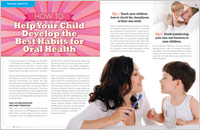
How to Help Your Child Develop the Best Habits for Oral Health Proper oral health habits are easy to learn — and lead to behaviors that result in lifelong dental health. And the time to begin is as soon as your child's first baby teeth appear. From toothbrushing for your toddler to helping your teenager stay away from tobacco, Dear Doctor magazine offers the most important tips for healthy habit formation through childhood and beyond... Read Article
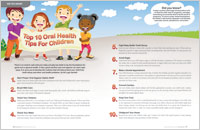
Top 10 Oral Health Tips for Children There's no need to wait until your baby actually has teeth to lay the foundations for good oral or general health. In fact, good nutrition and oral hygiene can start right away. It is up to you to develop the routines that will help protect your child from tooth decay and other oral health problems. So let's get started... Read Article
